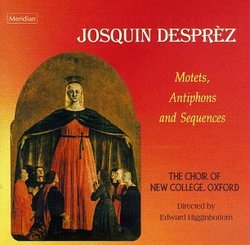Middling English
Duke | Italy | 06/08/2005
(3 out of 5 stars)
"Ah, yet another English choir washing all the pesky, irreverent dynamism out of the most soulful of high renaissance masterpieces, hanging them out to dry in that murky, gray-clad orb of hazy yellow that the English call a sun, all to be crisply folded with dogmatic solemnity and doleful reverence that English choirs deem fundamental to proper renaissance decorum. Nay, Sir Edward.
Slower, strict tempi are not an instant recipe for clarity and "ethereal" sonority, but a bore. Josquin probably never composed for boys voices, but for baritone falsettists - boys chanted, but did not usually take part in polyphony in Italy, or in the lands of Burgundy. Treble voices are pretty, but other voices should also shine through the polyphony because that's what it is - polyphony, more melodic imitation in equally weighted voices than quasi-baroque harmonic variation strung under a treble lead. To be sure, I don't care much for historically informed performances etc., and boys' voices can be nice, as can womens' voices, so long as the piece is treated as a work of the truest art.
All the motets on this disc have been recorded elsewhere, and I recommend listening to La Chappelle Royale under Herreweghe (the Stabat Mater they recorded is divine), the Tallis Scholars (Praeter Rerum Seriem on their CD of Rore is unsurpassed), the Orlando Consort, and the Hilliard Ensemble (now these last two show real musicianship and a delightfully fresh approach - and English to boot!). Ensemble Clement Janequin and Ensemble Organum (Missa Pange Lingua) are worth hearing for an idea of how to create solemnity without sacrificing interest.
On the plus side, and there is a plus side, the voices are tuneful and sonorous, and in listening one does keep a profound respect for the English choral tradition. Three stars because no matter what you do to Josquin, his music is indestructable and I have great joy in hearing it anyway. However, Josquin is too widely recorded to be missed with this recording. Keep searching."
One of my favorite recordings of all time
William Andriette | boston, ma United States | 10/23/2000
(5 out of 5 stars)
"It is impossible to convey the wonder of this performance. The music on this CD is some of the most wrenchingly exquisite I know of, and is sung with the highest degree of warmth and understanding. One usually associates Renaissance choral polyphony with reserve and repose, not warmth. But Josquin's odes to the Virgin possess striking emotion and tenderness. This is music that was written for and demands the male choral forces deployed here to make sense of its subject: the offering of thanks to maternal being, to the forces of material creation. But you don't need any theology to feel what this music is about. Were I marooned on the proverbial desert island or asked to represent humanity to space aliens, I would offer this music as sung here."


 Track Listings (7) - Disc #1
Track Listings (7) - Disc #1